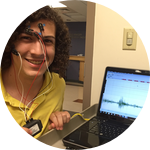About This Project
Knowing who to trust really matters. Otherwise, you risk being gullible, paranoid, unfriendly, or lonely. For people with BPD, these social difficulties often persist after other symptoms improve. This project will test how trust learning changes as people recover from BPD. The data we collect here will help us understand recovery, and let us plan future studies to test how treatment and brain changes can promote social recovery.
Ask the Scientists
Join The DiscussionWhat is the context of this research?
People with mental illness often experience remission (symptoms decreasing below the number you need to be diagnosed) but not recovery (getting back to a meaningful life). We think that better understanding of how people make calculations about what to do in social interactions is critical to helping people fully recover. Revealing differences in social behavior between people who do and do not recover will identify key targets for treatment.
What is the significance of this project?
Borderline Personality Disorder (BPD) is a common mental illness that affects 1/20 people. People with BPD who don't recover are at significantly increased risk of suicide. We are currently not good at knowing who will go on to recover and who will not. Focused experiments are urgently needed to identify barriers to recovery. Successful social interactions are at the heart of recovery. We are already using quantitative tools to measure detailed aspects of social interactions -- we now need to define differences between those who recover and those who do not.
What are the goals of the project?
We will enroll 100 people with BPD, half of whom have recovered 5+ years after their first mental health contact, and half who have not.
We will test differences between the 2 groups in specific aspects of social behavior in an interaction, such as initial trust, initial cooperation, willingness to coax a partner to cooperate, and changes in behavior after betrayal.
We will then use these results to hone plans for experiments that will identify the most relevant brain networks that contribute to recovery.
Budget
We will measure how people respond in a social interaction online that involves trust, betrayal, and cooperation. Research subjects will be recruited through Amazon's mTurk website to allow us to include diverse people from all over the United States.
The total cost to run one subject through our protocol is $10. We will run 50 BPD and 50 recovered BPD. The non-BPD group is funded separately.
We plan to buy a refurbished laptop computer to manage the online computer game and to analyze the results of the study with statistical software.
Funds over the proposed amount:
The first $500 over the proposed amount would pay plane fare to bring Dylan to Yale for an intensive 2 weeks of collaborative work.
Additional funds over the proposed amount will allow us to include additional variables, including gender and sexual orientation in the analysis by allowing us to recruit more subjects.
Endorsed by
Meet the Team
Sarah Fineberg
I am a psychiatrist and social neuroscience researcher at Yale University. I am most interested in understanding the difficulties people encounter in making meaningful social worlds, and how to repair social problems. I love that my job includes clinical care, research, and teaching students. I'm excited to be proposing this project with a very promising undergraduate student who is also passionate about solving problems in psychiatry!
Dylan Stahl
I am a senior undergraduate student at Knox College, where I'm working on an honors research project that uses computer-based games to investigate social learning in Borderline Personality Disorder. I spent last summer at Yale working with Dr. Fineberg, where I was able to talk with several people who suffer from BPD. I was inspired to develop a research project that includes groups we haven't yet studied much: men (that's my main honors project) and people who have recovered (I hope we'll succeed in this campaign so we can add this group). I am so excited about this research that combines new technical skills (I've learned to write a computer game for people to play online!) and social neuroscience with gaining knowledge that will help people suffer less. After college, I'll apply to MD PhD programs so I can continue work like this in the future.
Lab Notes
Nothing posted yet.
Project Backers
- 5Backers
- 6%Funded
- $129Total Donations
- $25.80Average Donation



